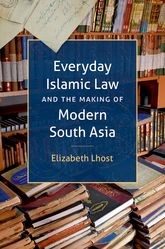 Everyday Islamic Law and the Making of Modern South Asia
Everyday Islamic Law and the Making of Modern South Asia
Contents
-
-
-
-
-
-
-
-
-
Defining Legal Categories Defining Legal Categories
-
From Private Inquiry to Public Debate: The Changing Landscape of Fatwa Writing in British India From Private Inquiry to Public Debate: The Changing Landscape of Fatwa Writing in British India
-
Publication, Republication, and Reception: Toward a New Corpus of Islamic Law Publication, Republication, and Reception: Toward a New Corpus of Islamic Law
-
Affirmation, Repetition, and Accretion: Fatwas and Substantive Legal Change Affirmation, Repetition, and Accretion: Fatwas and Substantive Legal Change
-
Conclusion: Rereading ʿAbd-ul-Hayy and Debating a New Corpus of Islamic Legal Literature Conclusion: Rereading ʿAbd-ul-Hayy and Debating a New Corpus of Islamic Legal Literature
-
-
-
-
-
-
-
-
4 Personal Law in the Public Sphere: Fatwas, Print Publics, and the Making of Everyday Islamic Legal Discourse
Get access-
Published:July 2022
Cite
Abstract
As legislation worked to limit and redefine the scope of Muslim personal law throughout much of the nineteenth century, an explosion of institutions and outlets for vernacular-language religious publishing catapulted conversations about personal and religious law into the public sphere. These conversations, which exploited new networks of communication that spanned the subcontinent, went beyond the limited range of topics that fell under the rubric of Muslim personal law and turned small-town religious scholars into public figures and publishing entrepreneurs. Introducing these entrepreneurial religious leaders, this chapter addresses the making of everyday Islamic law through the authorship and publication of fatwas (non-binding religious legal opinions written by muftis). It traces the mechanisms of affirmation, repetition, and accretion that transformed non-binding opinions into law-like rules and identifies the modes of transmission and communication that turned these otherwise private religious consultations into public discourses. This chapter uses the posthumous publication of ʿAbd al-Hayy Farangi Mahalli’s Collection of Fatwas (Majmūʻat al-fatāwá) to demonstrate how affordable vernacular publishing not only bolstered the personas of esteemed scholars but also contributed to the making of a new canon of South Asian legal literature. The chapter concludes by acknowledging the reception history of ʻAbd al-Hayy’s famed collection, as readers questioned his earlier opinions in the fatwas they requested from the next generation of muftis.
Sign in
Personal account
- Sign in with email/username & password
- Get email alerts
- Save searches
- Purchase content
- Activate your purchase/trial code
- Add your ORCID iD
Purchase
Our books are available by subscription or purchase to libraries and institutions.
Purchasing information| Month: | Total Views: |
|---|---|
| August 2024 | 1 |


Get help with access
Institutional access
Access to content on Oxford Academic is often provided through institutional subscriptions and purchases. If you are a member of an institution with an active account, you may be able to access content in one of the following ways:
IP based access
Typically, access is provided across an institutional network to a range of IP addresses. This authentication occurs automatically, and it is not possible to sign out of an IP authenticated account.
Sign in through your institution
Choose this option to get remote access when outside your institution. Shibboleth/Open Athens technology is used to provide single sign-on between your institution’s website and Oxford Academic.
If your institution is not listed or you cannot sign in to your institution’s website, please contact your librarian or administrator.
Sign in with a library card
Enter your library card number to sign in. If you cannot sign in, please contact your librarian.
Society Members
Society member access to a journal is achieved in one of the following ways:
Sign in through society site
Many societies offer single sign-on between the society website and Oxford Academic. If you see ‘Sign in through society site’ in the sign in pane within a journal:
If you do not have a society account or have forgotten your username or password, please contact your society.
Sign in using a personal account
Some societies use Oxford Academic personal accounts to provide access to their members. See below.
Personal account
A personal account can be used to get email alerts, save searches, purchase content, and activate subscriptions.
Some societies use Oxford Academic personal accounts to provide access to their members.
Viewing your signed in accounts
Click the account icon in the top right to:
Signed in but can't access content
Oxford Academic is home to a wide variety of products. The institutional subscription may not cover the content that you are trying to access. If you believe you should have access to that content, please contact your librarian.
Institutional account management
For librarians and administrators, your personal account also provides access to institutional account management. Here you will find options to view and activate subscriptions, manage institutional settings and access options, access usage statistics, and more.